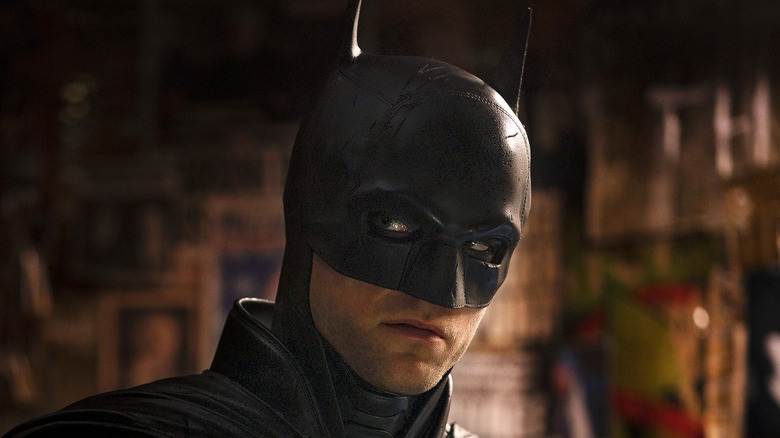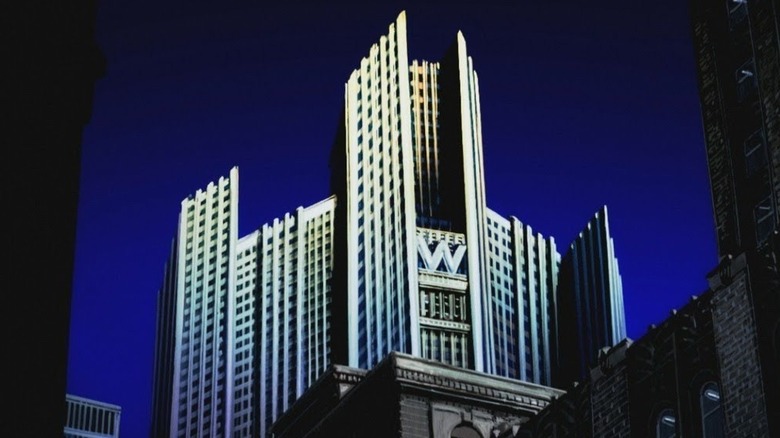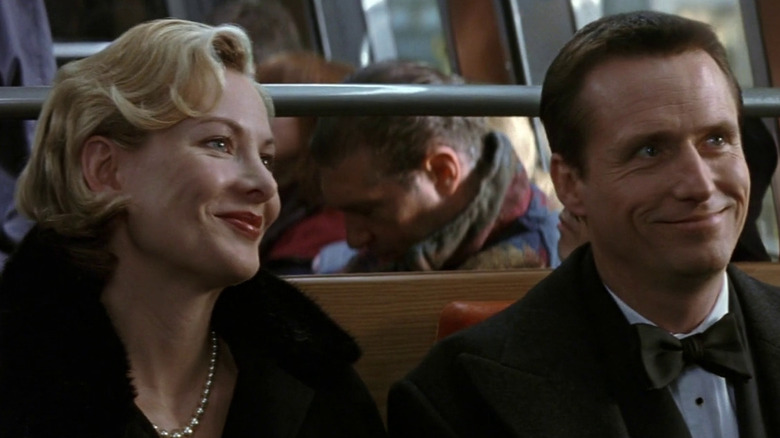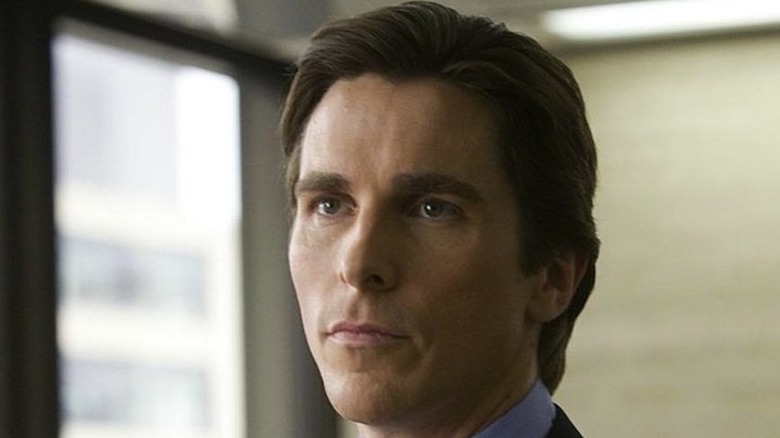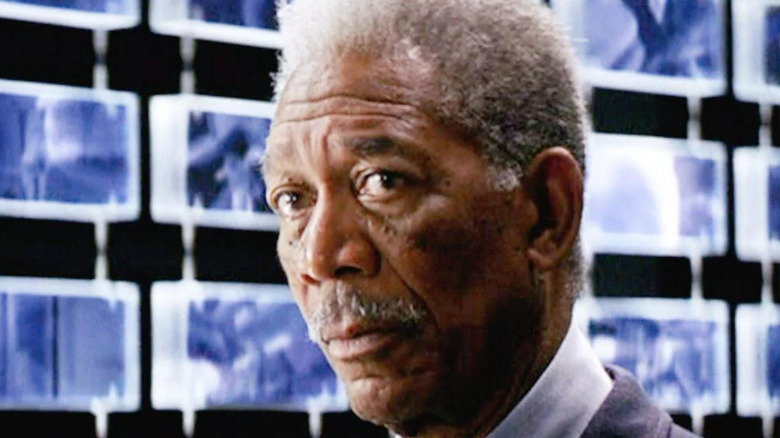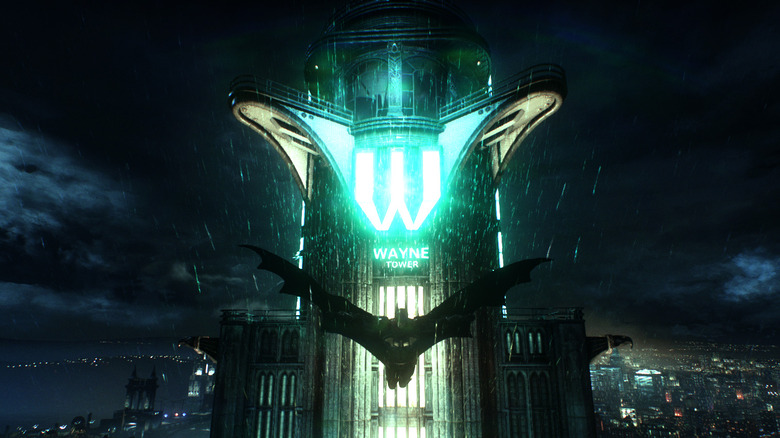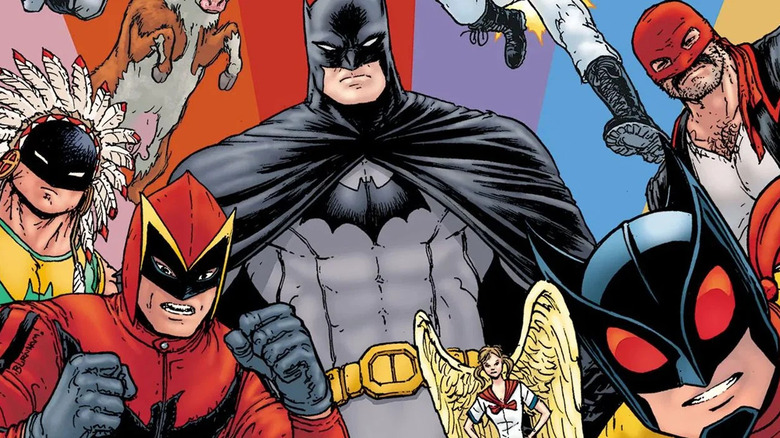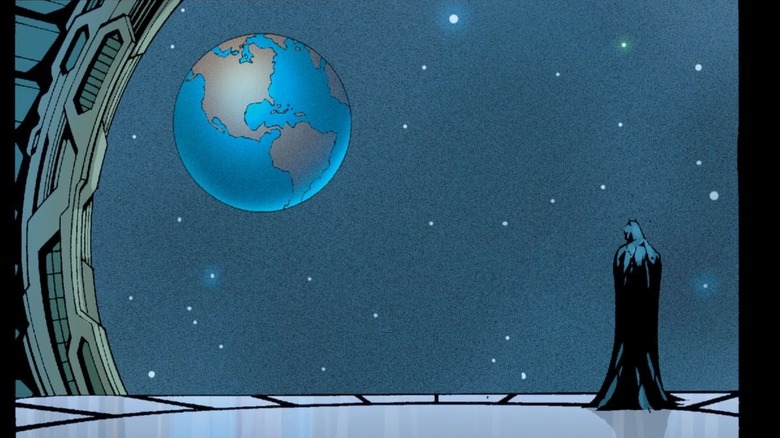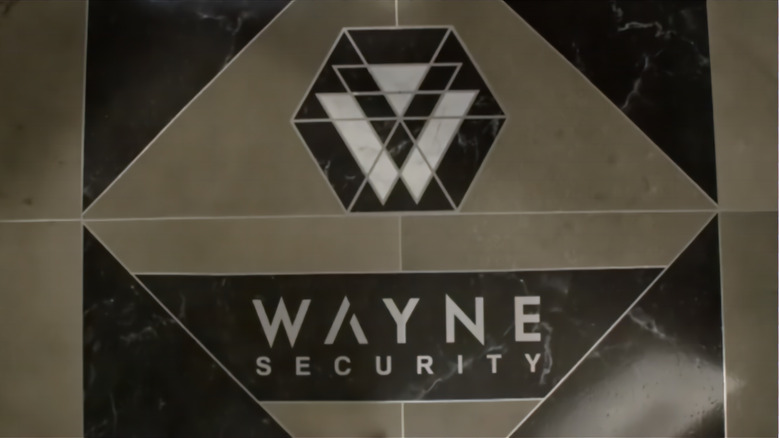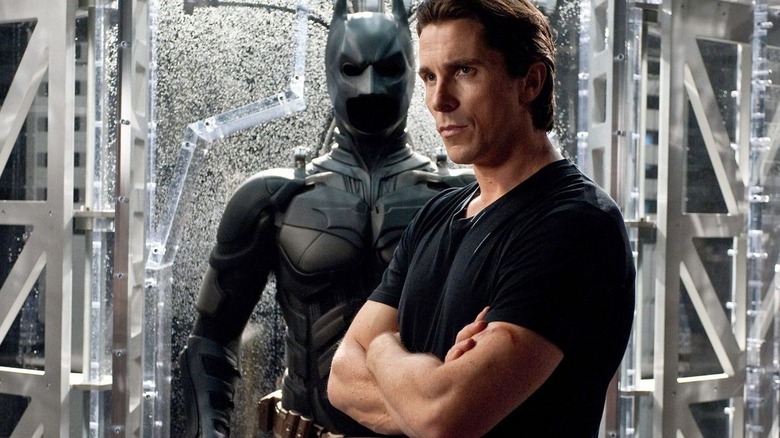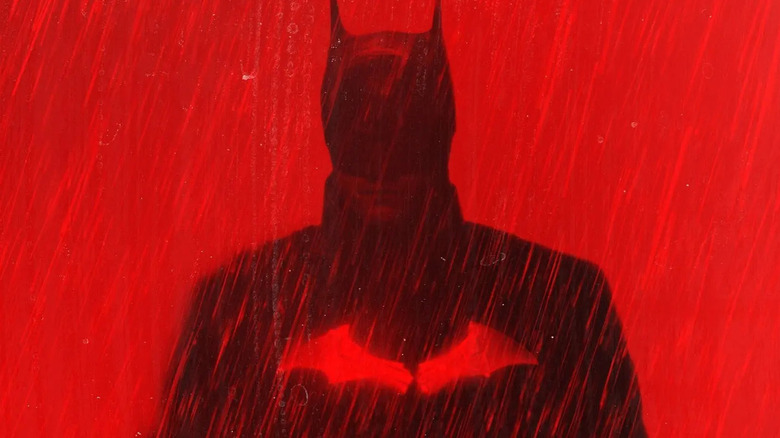The History Of Wayne Enterprises Explained
To combat crime in Gotham City, Bruce Wayne became Batman, and in doing so transcended from mere mortal to savior, superhero, and symbol. He accomplished this de novo apotheosis by rigorous physical training in every martial art, honing his mind into the world's greatest weapon, overcoming his every weakness and fear, and — above all else — by being filthy, stinking rich.
Wayne's money didn't suddenly spring up from nowhere, however. Rather, it was his longstanding birthright as a Wayne and therefore the heir to the Wayne Enterprises fortune. In the DC comics, and later in other Batman media, Wayne Enterprises is the mega-corporation built and expanded by generation after generation of Waynes. The business grew into a titanic conglomerate, along the way turning Gotham from minor settlement to metropolis (just not that Metropolis), ultimately giving Batman an endless influx of cash. Without Wayne Enterprises, Batman would be just another brilliant ninja — which yes, has worked out just fine for the Teenage Mutant Ninja Turtles, Daredevil, Elektra, Deathstroke, Snake Eyes, and a host of others. But Batman is beyond them all, thanks in large part to the (literally) towering financial institution supporting his every move. To get to know Batman's benefactor, here's the entire history of Wayne Enterprises explained.
Founding
Though the company has seen its share of variations throughout the DC multiverse and its multiple reboots, the classic story of Wayne Enterprise's founding dates back to the founding of the United States itself. Over the years, DC has gradually interwoven the history of the Wayne tribe with that of the real-life Waynes, including actual Revolutionary War General Anthony Wayne. From Anthony and his fictional brother Darius, the Wayne lineage continues to the brothers Solomon and Joshua Wayne, who were the key figures in transitioning a moderately wealthy family to Gotham City architects and influential magnates during the 17th and 18th centuries.
By the time of the Industrial Revolution, the company largely was largely shepherded by Solomon's son Alan, who embraced the cultural evolution with gusto. As detailed in "Batman: Secret Files and Origins," Alan used Wayne Enterprise subsidiaries like Wayne Shipping and Wayne Manufacturing to not only build the company's prominence, but also that of Gotham City itself. From Alan through to grandson Patrick, Wayne Enterprises expanded ever farther, bringing Gotham City with it. By the end of the two World Wars, Wayne Enterprises was one of the largest conglomerates in the world and had become almost inexorably fused to Gotham City itself.
Thomas and Martha
Patrick and his wife Laura had a son, whom they named Thomas. When grown, Thomas Wayne married Martha, and under their joint leadership, Wayne Enterprises shifted its focus and expanded its operations more than ever. Unsatisfied with mere money and influence, Thomas and Martha pushed the company to be something better — to not simply do more, but do more good. The pair, a true power couple, jointly pushed Wayne Enterprises and its many subsidiaries toward environmental consciousness and philanthropy. The two created a branch of Wayne Enterprises known as the Wayne Foundation, itself subdivided into the Thomas Wayne Foundation and the Martha Wayne Foundation.
The foundations' emphasis on charity represented a complete paradigm shift for corporations of their size, one that competitors such as LexCorp never truly embraced. Thomas and Martha dedicated unprecedented fractions of their corporate revenue into benefitting causes such as poverty, hunger, homelessness, crime, and a number of social services. Thomas, a surgeon, built a number of hospitals and free clinics across Gotham, and Martha, his equal and opposite, balanced their scientific endowments with those for the arts. The two were pinnacles of goodwill and responsibility, and so it's easy to see where their son Bruce Wayne gets it from.
Bruce returns
Following Thomas and Martha's murder, young Bruce — the would-be heir to Wayne Enterprises — found himself suddenly lacking structure, support, and a philosophical anchor. What was once an idyllic childhood made from equal parts obscene wealth and unconditional love quickly became an anchorless state of despair and confusion. Needless to say, the boy turned away from Wayne Enterprises and its affairs in order to find himself. While Bruce was away, Wayne Enterprises continued on much as it had, run by its board of directors. Though none of them shared Thomas and Martha's virtue, they nonetheless kept the company afloat and maintained its expansion.
When Bruce Wayne returned to Gotham, now a young man with a newfound quest for justice, he accepted his rightful position as head (depending on the version, Wayne is CEO, president, board chair, majority shareholder, or just symbolic figurehead) of the company. With every ounce of focus spent on crimefighting and building the Batman's legend among criminals, young Wayne's leadership of Wayne Enterprises was lacking. Though he was able to accomplish some major acts of good through the company, such as the funding of other heroes' campaigns, his overall effectiveness was lacking and the company failed to evolve as it once had.
Lucius Fox
Realizing his responsibility in steering Wayne Enterprises toward accomplishing the most good, Bruce hired Lucius Fox, who possessed a rare combination of brilliance in business and upstanding moral character. It was Fox, and Fox alone, whom Bruce trusted to shepherd his family's fortune toward not only sustained growth but consistent generosity. As DC Comics put it, "If Alfred Pennyworth is the man behind the Bat ... Lucius Fox is the man behind Bruce Wayne."
With Fox at the Wayne Enterprises helm, Bruce was finally able to dedicate himself fully to his righteous vigilantism, confident that the vast fortune attached to his name would neither disappear nor descend into miserliness. Depending on the time period of publication and the particular incarnation of Batman, Fox can have several different relationships with Batman — though all of them are critical. In some iterations, Fox is fully aware that Bruce is Batman and actively turns his brilliant mind toward assisting Bruce's caped crusades, as in Christopher Nolan's Dark Knight trilogy. In others, Fox keeps the true extent of his awareness deliberately obscure in order to maintain, again as DC Comics puts it, "plausible deniability." In either case, Fox is at the head of Wayne Enterprises and ensures its survival through the modern age.
Wayne Tower
Though Wayne Enterprises is a true behemoth of a corporate entity, spanning the globe and extending its tendrils into virtually every aspect of commerce, a few of its holdings stand out from the rest. Aside from perhaps the decidedly non-commercial Wayne Manor, Wayne Enterprises' most iconic asset is Wayne Tower. The Tower needles up through the ever-evolving Gotham skyline, serving as a symbol to all the city's civilians — though the symbol varies wildly depending on their situation. For Gotham's downtrodden, the spire symbolizes everything wrong with the city and its lopsided distribution of wealth. For the Waynes themselves, especially for Thomas, Martha, and Bruce, it's more of a bridge than a tower, keeping the Waynes in the center of the city and close to its people. To the many Gotham supervillains and thieves, it's a constant enticement and opportunity for advancing a criminal agenda. Yet no matter who views it, and in nearly every iteration of Batman, Wayne Tower is the headquarters for Wayne Enterprises, and therefore the center for all things Wayne and all things Gotham. Even more importantly, the site serves as the primary location for Batman's trademark vigilance atop gothic gargoyles.
Batman, Inc.
In the modern era, there are few creative names more associated with Batman comics than writer Grant Morrison. He has written Batman for decades, often as the character's chief creative architect. In 2011, Morrison took Batman, along with Wayne Enterprises, into a fresh new direction with the series "Batman, Incorporated." The story saw Bruce utilize Wayne Enterprises for his war on injustice more than ever. Instead of using Lucius to quietly shuffle money from Wayne Enterprises into his own tech, Bruce began publicly funding Batman, and even publicly funding "franchises" of Batmen across the globe. In a sense, the "Batman, Inc." storyline took what Wayne Enterprises had done with its many subsidiary companies and had Batman do the same for his many heroic allies.
The storyline, though it only ran for around two years, represented the most Batman, Bruce Wayne, and Wayne Industries had ever blended into one being. It's been said time and again that Batman's greatest superpower is his fortune, and "Batman, Inc." demonstrates the truth in that statement more than any other series. Though eventually Bruce's transparency was the initiative's undoing, it did serve to prove the untapped power that Wayne Enterprises holds in the larger crimefighting world.
Affecting a universe
Outside the relatively short run that "Batman, Inc." received, Wayne Industries has proven itself a major benefactor to the greater superhero community many other times through the years, whether openly or secretly. The story arc "Batman: Hush" made it clear that Wayne Enterprises subsidiary Wayne Entertainment owns Metropolis newspaper The Daily Planet — technically making Batman Superman's boss, but more importantly demonstrating the level to which Bruce uses Wayne Enterprises to keep important institutions from going under.
As integral as the Daily Planet is to DC lore, depending on the canon and iteration in question, Bruce funds a much bigger and much more important workplace: The Watchtower, the Justice League's satellite (or moon-based) headquarters. Though several members of the Justice League are wealthy, such as the Green Arrow and Aquaman, none possess the combination of wealth and infrastructure that Batman does, solely thanks to Wayne Enterprises. Between Wayne Technologies, Wayne Energy, Wayne Electronics, and Wayne Aerospace, there likely isn't a single person on the planet more equipped to design, construct, and afford their own orbital space station. In addition, Bruce has used Wayne Enterprises as a benevolent shield over the years, buying up corporations with dangerous patents and sitting on them or keeping loved ones from losing their jobs.
On television
Arguably, aside from the comics, Wayne Enterprises looms the largest on television. In almost every major cartoon series, such as "Batman: The Animated Series" and 2004's "The Batman," Batman is in some capacity head of Wayne Enterprises. The "Batman Beyond" series even made Wayne Enterprises a major plot point, as an elderly Bruce seeks to reclaim control of the company after losing it decades before. Batman's many cartoon avatars have emphasized the dual nature of the character, highlighting the difference between businessman Bruce and vigilante Batman.
Wayne Enterprises flows through the arteries of Batman's live-action television appearances as well. The Fox series "Gotham," for example, placed itself in the unique and fruitful position of starring an adolescent Bruce Wayne, who attempts to ferret out corruption from its leadership. The young Bruce at first battles unscrupulous board members, but soon moves on to the company's real threat: the underworld syndicate known as the Court of Owls. Another series, the NBC sitcom "Powerless," was actually set in the workplace of Wayne Enterprises subsidiary Wayne Security. Though the series was short-lived, it did present a fun window into Wayne Enterprises from the bottom up instead of our usual Bruce Wayne-down perspective.
The Nolanverse
Throughout the Tim Burton and Joel Schumacher Batman films, Wayne Enterprises serves mainly as a silent background presence which, we have to assume, provides the Batman with his resources. Then Christopher Nolan's critically acclaimed Dark Knight trilogy put the company in a central position, weighing heavily on the films' tone, plot, and setting. Through the films, the company acts almost as its own character, equal parts at odds with Bruce and his ally. Bruce renounces the company as a child, only to return in grand fashion and seize tight control. He uses the company to further his personal and professional goals but comes dangerously close to turning the whole enterprise into a liability.
The second film, "The Dark Knight," presents viewers with the holy/unholy trinity of Batman, Jim Gordon, and Harvey Dent, all of them equal parts dirty and clean, and perhaps Gotham's best hope. But all three movies in the trilogy are dominated by another, less-heralded trinity: Bruce Wayne, Lucius Fox, and Wayne Enterprises itself. The three work together to play with the bounds of legality and morality in order to give Batman the inhuman amount of power he needs to defeat his greatest enemies. Without Wayne Enterprises, the Dark Knight trilogy would have played out at 1/10 scale.
The Batman
Spoilers for "The Batman" ahead.
In Matt Reeves' "The Batman," Wayne Enterprises plays a subtle but pervasive role in the tone and narrative. Early in the movie, Bruce tells Alfred in no uncertain terms his stance on Wayne Enterprises, saying "I don't care about that. Any of that." True to his word, Bruce spends the vast majority of the movie avoiding any references to the company, and especially to his potential leadership thereof.
But even though Bruce distances himself from the company, he can never actually escape it, as the film repeatedly hammers home the fact that Gotham is tied to Wayne Enterprises and vice versa. Reporters refer to the Waynes as "Gotham's founding family" and the Wayne-constructed train system is a fixture in every other scene. Further, the film's entire plot centers around the legacy of Thomas and Martha Wayne. The pair promised so much to the city and its people, and evidently planned to see it through, but following their deaths, their goodwill was quickly perverted and became a source of Gotham's trouble. Without Wayne Enterprises, "The Batman" would lose its central, inciting pressure, as well as its creepy gothic design sense.
